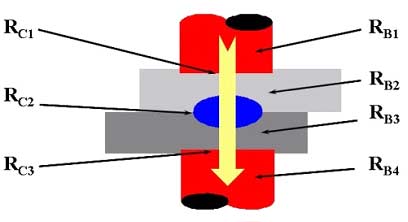Resistanssvetsning - Amada Weld Tech
Resistance welding is an electrical process where heat is produced at the interface of the parts to be joined. An electric current passes through the parts to an accurately controlled time and under a controlled pressure. The name "resistance welding" comes from the fact that the resistance of workpieces and electrodes is used in combination or contrast to generate heat.
The benefits of resistance welding is:
- Very short process time
- No additives such as solder
- High operator safety due to. low voltage
- The process is clean
- Reliable electromechanical connection is formed
Resistance welding is a fairly simple heating process: passing the current through a resistor generates heat. Resistance is affected by surface properties (surface durability, cleanliness, oxidation and coating).
The general heat production formula for resistance welding is: Heat = I ² x R x T x K
"I" is the current through the workpiece, "R" is the electrical resistance (in ohms) of the workpiece, "t" is the welding time (in hertz, milliseconds or microseconds) and "K" is a thermal constant. The welding current (I) and the duration of the current (t) are controlled by the resistance welding power supply. The resistance of workpieces (R) is a function of welding force and used material. The thermal constant "K" can be affected by some geometry, the fixture and the welding force.
Contact resistance in the workpiece, electrodes and their interfaces affect the amount of heat. The diagram above shows resistance values which together help determine the heat generated.

DC25 / UB25 Linear DC Welding Controls
- Linear DC DC25 and UB25.pdf 274 KB

HF27 / HF25 High Frequency Welding Control
- High Frequency HF25-27.pdf 336 KB

Inverter Power Unit ISQ20 Compact

AWS3 - Active Welding System and Components
- AWS3 Pneumatic.pdf 1.4 MB
- AWS3 Servo Motorised.pdf 1.3 MB
- ISQ Series.pdf 873 KB
- MFP-1 MFP-2 Weld Heads for AWS3.pdf 1.3 MB
- MFP-25 High Precision Weld Head.pdf 1.2 MB
- MFP-Z-1 MFP-Z-2 Weld Pincers for AWS3.pdf 845 KB

High power DC Linear supplies from 180 to 1250kVA

Capacitive Discharge Power Supplies
- ADP Series.pdf 203 KB
Welding heads

Thinline Series Weld Heads
Thinline Weld Heads consists of four series of fully equipped weld heads.
- 50 series
- 80 Series - 9kg and 18kg
- 90 Series - 68kg
- 180 Series - 45kg
Qualities:
- Adjustable Forcetrigger
- Low inertia in the system
- Air controlled alternatives (pneumatic)
- Adjustable spring force
- One air regulator
- Up to 1.5 inches (38 mm) stroke
- Adjustable stops both up and down
- EZ-AIR-technique

70 Series Servo Motor Driven Weld Heads
Designed for use in automation or bench welding. Miyachi Unitek's 70 series is stable with high repeatability in electrode power for a wide range of applications in resistance welding. Two different models are available, each equipped with a programmable servo motor that enables precise electrode positioning and speed planning for up to 32 different welding programs.
Qualities:
- Controlled and fast with good repeatability
- Extremely good force control from 225 grams
- External control I / O and PC communication
- Placement and power measurement as an option
- "Soft Touch" product clamping

Newhorizon Resistance welders
Miyachi Peco releases a new generation of resistance welding equipment that enables you to choose the perfect solution by choosing the right module for the right application.
- Newhorizon.pdf 1.8 MB


